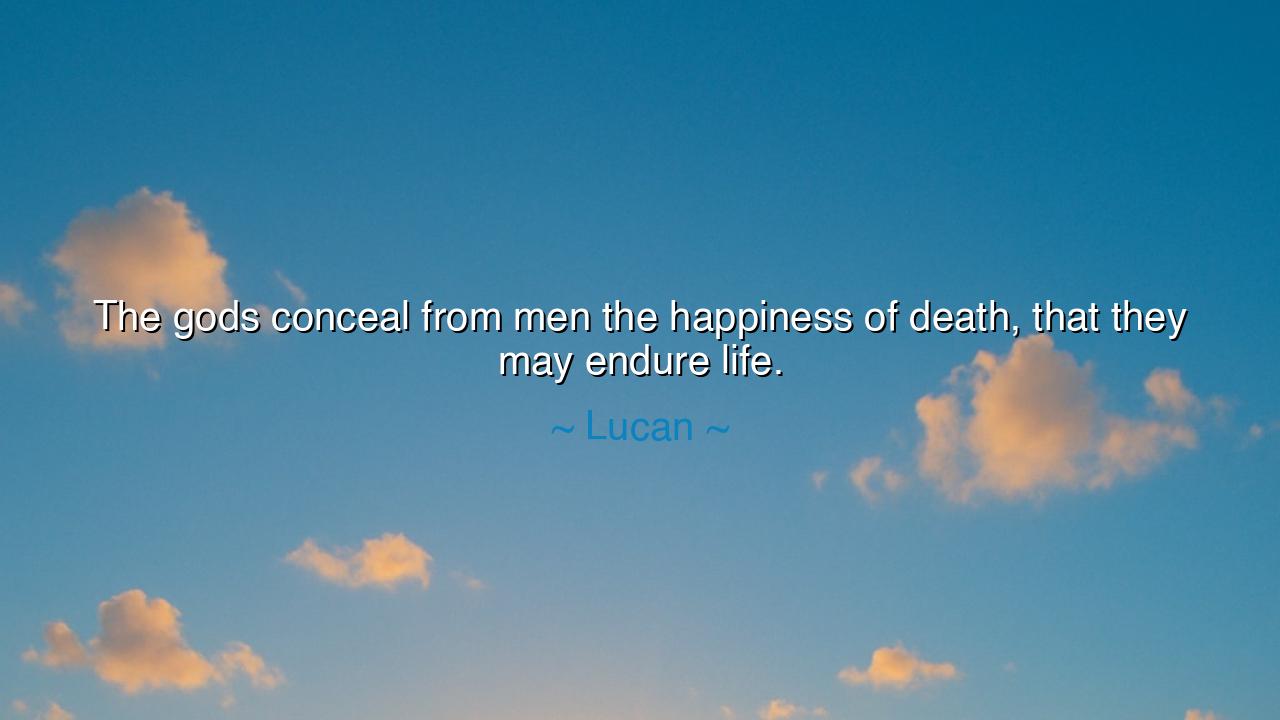
The gods conceal from men the happiness of death, that they may






The words of Lucan, “The gods conceal from men the happiness of death, that they may endure life,” flow like a dark river from the heart of ancient Rome, where men wrestled with destiny, suffering, and the unyielding march of fate. In these words lies not despair, but divine wisdom—a recognition of the fragile balance between existence and eternity. The poet does not glorify death; he unveils the mercy in ignorance. For if men truly knew the peace beyond the grave, if the shroud of mystery were lifted and the sweetness of eternal rest revealed, who among them would bear the burden of the world a single day longer? Thus, the gods, in their hidden kindness, conceal the joy of death, that we might persevere, that we might strive, that we might live out the full measure of our mortal design.
Lucan, the Roman poet and philosopher, lived in an age of tyranny and war. His world was ruled by Caesar’s shadow, and freedom had become a memory wrapped in chains. He saw men broken by ambition and nations devoured by civil strife. In this chaos, he discerned a truth few dare to speak: that suffering is the crucible of meaning, and that the endurance of life—its struggles, losses, and relentless trials—is what forges the human spirit. To Lucan, death was not to be feared but understood as release. Yet he believed the gods, in their cosmic wisdom, veiled this release from mortal eyes, lest man abandon his sacred duty to endure and evolve.
Consider the example of Socrates, the philosopher of Athens, who awaited his death with serenity and joy. When the cup of poison was brought to him, he did not tremble but smiled, saying that death was but a journey to another realm of truth. To him, life was a preparation for the soul’s liberation. Yet most men are not Socrates. They cannot see the infinite; they cling to the fleeting warmth of the sun. If all men knew—as Socrates did—the happiness of death, the world might fall into stillness. Fields would remain untilled, temples unbuilt, and the cries of children never heard. The veil of ignorance, then, is a divine gift—it keeps us bound to purpose, to love, and to struggle.
There is a paradox here: what we fear most may be the very thing that brings us peace, and what we cling to most—life itself—may be the source of endless pain. Yet in this paradox lies the great human journey. To live well is to endure with courage, not because life is easy, but because it is sacred. The gods conceal the happiness of death, not to mock us, but to teach us to find meaning in the midst of mortality. If death’s sweetness were known too soon, mankind would forsake the long, painful road of experience—the very road that shapes compassion, wisdom, and the nobility of the soul.
History offers us countless souls who endured unbearable pain, yet through endurance found greatness. Consider Viktor Frankl, a man imprisoned in the death camps of the twentieth century. Surrounded by death, he did not despair, but discovered that even in suffering, man retains one final freedom: the power to choose his response. Had the “happiness of death” been unveiled to him in that moment, perhaps he would have welcomed it. Yet because it was hidden, he endured—and from his endurance came a philosophy that has saved millions from despair. Thus, Lucan’s truth echoes through the ages: ignorance of death’s peace is the mother of life’s perseverance.
The lesson, then, is this: life is meant to be borne, not escaped. The veil between life and death exists not as a punishment but as protection. In our blindness to eternity, we are compelled to live each day fully, to love without guarantee, to labor with hope even in the face of futility. We are like travelers who do not know the end of their road; it is this unknowing that gives each step its power. The gods hide the final rest, that we might learn the holiness of the journey itself.
So, O listener, when despair darkens your path and life feels heavy as stone, remember Lucan’s wisdom. Do not curse the veil that hides the afterlife—thank it. For it is that very mystery that keeps your heart beating, your hands building, your soul learning. Embrace life’s storms as the gods intended, knowing that the peace of death waits not as an escape, but as the crown of endurance. Live as though you have been chosen to bear witness to existence itself, for that is what you are—a spark of divine resilience, sustained by the mercy of unknowing.
And when the final moment comes, and the veil is at last lifted, you will see—as Lucan foresaw—that there was never cruelty in concealment, only compassion. For the gods, in hiding the happiness of death, taught mankind the greater joy: the courage to live.






AAdministratorAdministrator
Welcome, honored guests. Please leave a comment, we will respond soon